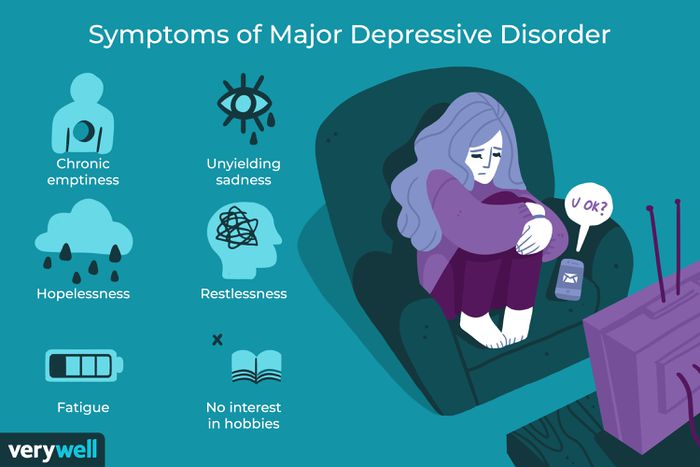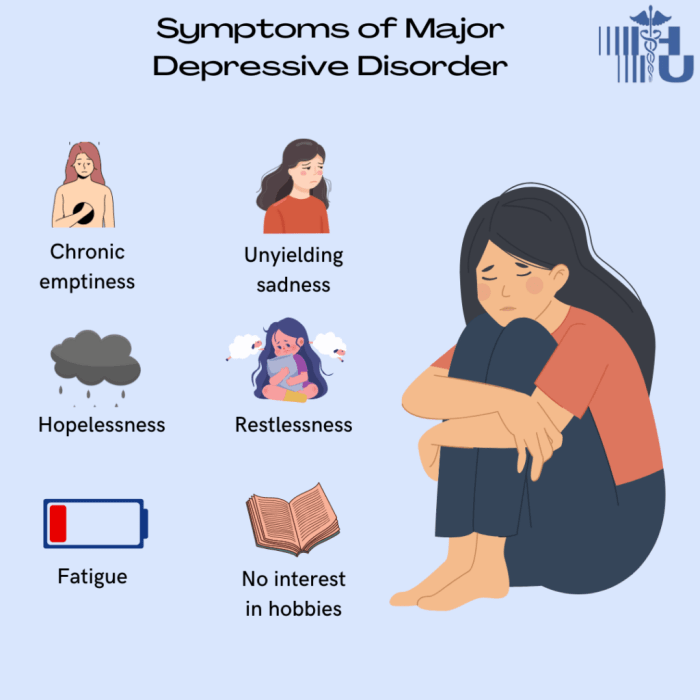Alexis experiences the symptoms of major depressive disorder, a common but serious mental health condition that can significantly impact a person’s life. This narrative delves into the complexities of MDD, examining its symptoms, causes, diagnosis, treatment, and coping mechanisms, providing a comprehensive understanding of this prevalent disorder.
Major depressive disorder is characterized by a persistent feeling of sadness and loss of interest in activities that were once enjoyable. Alexis’s journey with MDD illustrates the diverse ways in which this disorder can manifest, highlighting the importance of recognizing and addressing its symptoms.
Introduction

Major Depressive Disorder (MDD) is a mental health condition characterized by persistent feelings of sadness and hopelessness. It can affect a person’s thoughts, behavior, and physical health. Alexis is currently experiencing symptoms consistent with MDD.
Symptoms of MDD

The symptoms of MDD can vary in severity and duration. Alexis may be experiencing some or all of the following symptoms:
- Persistent feelings of sadness, emptiness, or hopelessness
- Loss of interest or pleasure in activities that were once enjoyable
- Changes in appetite or weight (either significant weight loss or gain)
- Difficulty sleeping or sleeping too much
- Fatigue or loss of energy
- Feelings of worthlessness or excessive guilt
- Difficulty concentrating or making decisions
- Recurrent thoughts of death or suicide
Causes of MDD: Alexis Experiences The Symptoms Of Major Depressive Disorder
The exact causes of MDD are not fully understood, but it is believed to be caused by a combination of genetic, environmental, and psychological factors. Some potential causes include:
- Genetic factors: MDD can run in families, suggesting a genetic predisposition to the disorder.
- Environmental factors: Stressful life events, such as trauma, loss, or financial problems, can increase the risk of developing MDD.
- Psychological factors: Certain personality traits, such as perfectionism or low self-esteem, can make a person more vulnerable to MDD.
Diagnosis of MDD
MDD is diagnosed by a mental health professional, such as a psychiatrist or psychologist. The diagnosis is based on a clinical evaluation, which includes a physical exam and a review of the person’s symptoms. The criteria for diagnosing MDD include:
- Five or more symptoms of MDD have been present for at least two weeks
- The symptoms cause significant distress or impairment in social, occupational, or other important areas of functioning
- The symptoms are not caused by a medical condition or substance abuse
Treatment for MDD

There are several effective treatments for MDD, including:
- Medication: Antidepressants, such as selective serotonin reuptake inhibitors (SSRIs) and serotonin-norepinephrine reuptake inhibitors (SNRIs), can help to improve mood and relieve symptoms.
- Therapy: Cognitive-behavioral therapy (CBT) and interpersonal therapy (IPT) are two types of therapy that can help people with MDD to learn coping mechanisms and change negative thought patterns.
- Lifestyle changes: Exercise, a healthy diet, and getting enough sleep can all help to improve mood and reduce symptoms of MDD.
Coping with MDD
Coping with MDD can be challenging, but there are several strategies that can help:
- Self-care: Taking care of yourself physically and emotionally is essential for coping with MDD. This includes eating a healthy diet, getting enough sleep, and exercising regularly.
- Support systems: Having a strong support system of family, friends, or a support group can provide emotional support and help you feel less alone.
- Professional help: If you are struggling to cope with MDD, it is important to seek professional help. A mental health professional can provide you with support, guidance, and treatment.
Essential Questionnaire
What are the common symptoms of major depressive disorder?
Persistent sadness, loss of interest in activities, changes in sleep and appetite, feelings of worthlessness or guilt, difficulty concentrating, and thoughts of self-harm or suicide.
What are the potential causes of major depressive disorder?
Genetic, environmental, and psychological factors, such as a family history of depression, stressful life events, and certain personality traits.
How is major depressive disorder diagnosed?
Through a clinical evaluation by a mental health professional, who will assess symptoms and rule out other potential causes.
What are the treatment options for major depressive disorder?
Medication, therapy, lifestyle changes, and a combination of these approaches.